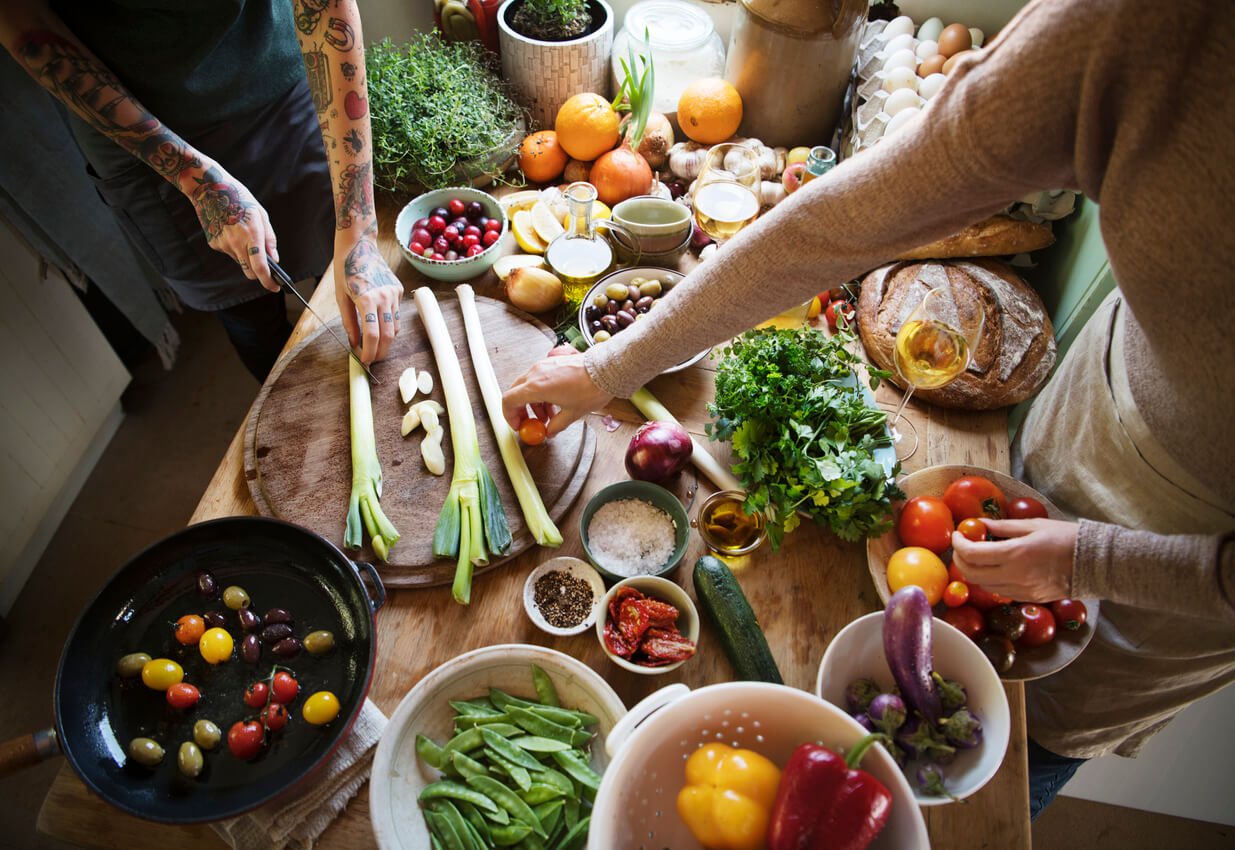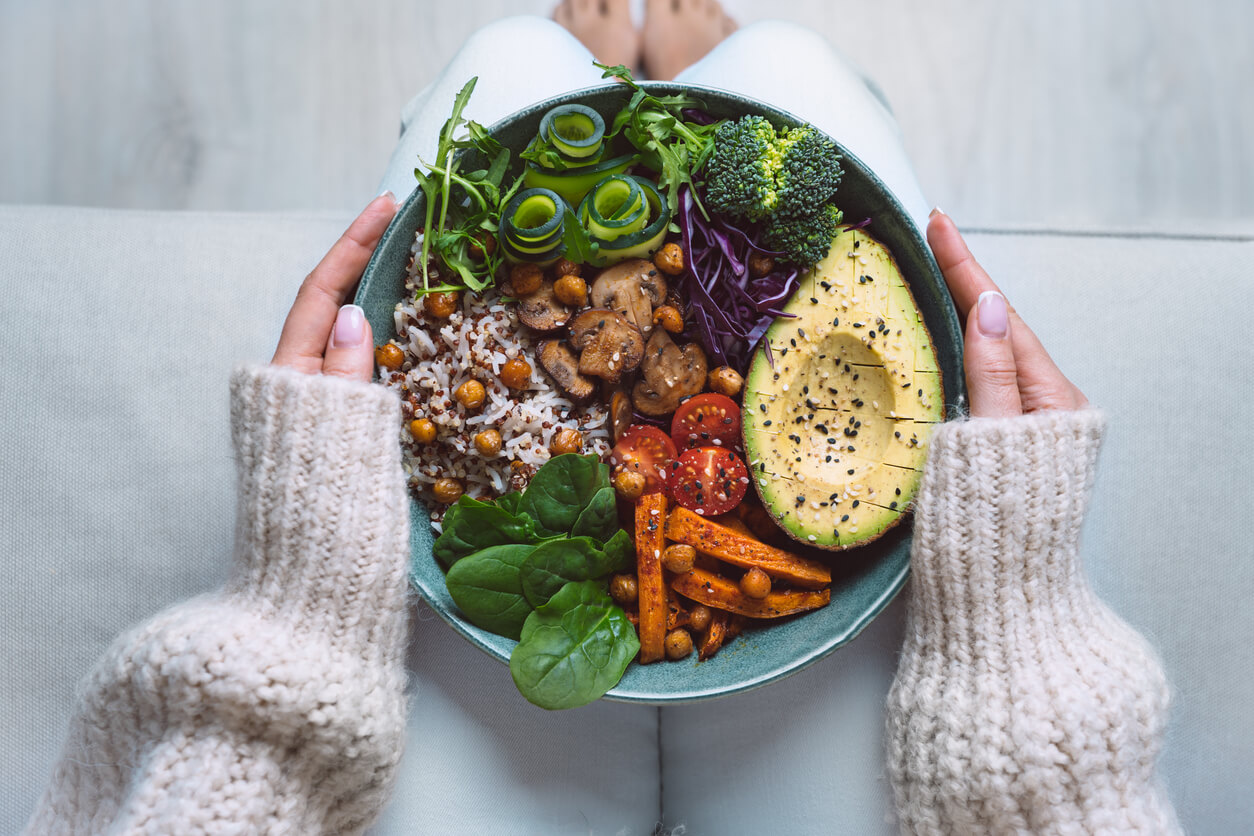How to Maintain a Balanced Diet if You Have Little Time for Cooking

In the midst of daily obligations, where time slips away between work commitments, family responsibilities, and the constant search for a healthy life, we often face a colossal challenge: How to maintain a balanced diet. Keep reading and discover how to nourish your body properly without compromising your busy schedule.
How many times have you found yourself at the crossroads of choosing between a fast food meal and a healthy option that seems to require more time? The quality of the food you eat impacts your energy levels, your mental clarity, and, ultimately, your ability to approach daily challenges with a strong mind and resilient body.
You might be interested in: The Delta Diet: What is it?
5 strategies to maintain a balanced diet in a hurry
Having time constraints or limited cooking skills doesn’t mean you have to forgo healthy, efficient eating. From planning quick and nutritious recipes to purchasing ready-to-eat prepared meals, we’ll explore strategies that can transform your diet and improve your well-being.
1. Plan intelligently

The key to maintaining a balanced diet in the midst of daily chaos lies in good planning and efficient organization. This way, meal preparation won’t become an overwhelming task, and you’ll be able to spend less time in the kitchen and enjoy delicious and nutritious recipes. Here are some tips you can use:
- Choose a weekly menu: designing a menu each week allows you to visualize meals in advance, making it easier to choose healthy and varied options.
- Assign theme days: In order to have varied meals and simplify ingredient selection, designate theme days such as “Vegetable Monday” or “Protein Wednesday.”
- Prepare the shopping list: before heading to the supermarket, make a detailed list based on your weekly menu. This saves time and prevents you from making impulse purchases.
2. Prepare quick and nutritious recipes
According to the UK National Health Service (NHS), the recommended daily calorie intake is 2000 calories for women and 2500 for men. If you want to lose weight, you need to use more energy than you consume in a balanced diet, and if you want to gain a few pounds, you need to eat more calories than your body requires.
These are some recipes that you can prepare and store in the refrigerator without losing their flavor:
Orange chicken with broccoli (450 calories)
- Sauté chicken pieces in chunks in a pan with pre-packaged orange sauce.
- Cook broccoli steamed or in the microwave.
- Serve chicken and broccoli over cooked brown rice – ready to enjoy in minutes!
Chicken Caesar Bowl (280 calories)
- Grill chicken breasts or buy the rotisserie chicken of your choice.
- Place greens in a bowl and add cooked quinoa, halved cherry tomatoes, and chicken strips.
- Add a light Caesar dressing to taste.
Pork tacos (340 calories)
- Cook pork in a pressure cooker and shred it.
- Heat 3 whole wheat tortillas in the microwave or in a frying pan.
- Fill the tortillas with 25 grams of shredded pork, onion, and cilantro. Squeeze lime over them.
- If you don’t like tortillas, you can accompany the meat with a portion of rice.
Quinoa salad with chickpeas and vegetables (300 calories)
- Stir in cooked quinoa with rinsed and cooked chickpeas, halved cherry tomatoes, sliced cucumber and spinach.
- Dress with olive oil and lemon juice.
Teriyaki Chicken Bowl with Brown Rice (380 calories)
- Sauté chicken cubes in pre-packaged teriyaki sauce.
- Cook peppers and onion in the same pan.
- Serve over cooked brown rice and enjoy.
Read more: What to include in your diet if you are a vegetarian athlete
3. Store your food efficiently
After food preparation is complete, the key to preserving freshness and efficiency throughout the week is strategic storage. To do this, opt for airtight containers for individual servings and label each container with the date of preparation.
A great idea to make your daily meal hunting easier and maintain a balanced diet is to dedicate a specific area in the fridge for ready-to-eat foods. In turn, regular rotation ensures that older recipes are consumed first, minimizing waste and providing a constant variety of healthy and convenient options.
4. Buy healthy prepared meals online
If you’re on a tight schedule and your culinary skills aren’t the best, considering ready-made meals is a great advantage of the modern era. There are websites that specialize in healthy recipes with a vast catalog of options (such as vegetarian dishes and protein-rich options) that allow you to explore new flavors and meet your nutritional goals.
Many online prepared meal services allow you to customize your choices based on your dietary preferences, allergies, or specific goals, ensuring that every bite aligns with your individual needs. Best of all, they deliver your meals to your doorstep, so all you have to do is heat them up and enjoy them.

5. Adopt conscious eating habits
On the journey to food awareness, listening to your own body becomes a crucial skill. By tuning into your body’s hunger and satiety signals, you develop a greater awareness of when to eat and when to stop and foster a more intuitive relationship with food.
Remember that in the journey toward a balanced diet, obstacles are inevitable, but facing them can transform them into opportunities to consolidate healthy eating habits. For example, the temptation to snack can be countered by keeping healthy snacks on hand and setting rewards aligned with your health goals.
Maintain a balanced diet and take care of your well-being
Nutrition is more than a physical act; it’s an investment in your long-term quality of life. So, don’t underestimate the power that good nutrition can have on your overall wellness and put into practice the above strategies to have a good diet regardless of time constraints. The journey to a better version of yourself starts with nourishing your body with love and care!
In the midst of daily obligations, where time slips away between work commitments, family responsibilities, and the constant search for a healthy life, we often face a colossal challenge: How to maintain a balanced diet. Keep reading and discover how to nourish your body properly without compromising your busy schedule.
How many times have you found yourself at the crossroads of choosing between a fast food meal and a healthy option that seems to require more time? The quality of the food you eat impacts your energy levels, your mental clarity, and, ultimately, your ability to approach daily challenges with a strong mind and resilient body.
You might be interested in: The Delta Diet: What is it?
5 strategies to maintain a balanced diet in a hurry
Having time constraints or limited cooking skills doesn’t mean you have to forgo healthy, efficient eating. From planning quick and nutritious recipes to purchasing ready-to-eat prepared meals, we’ll explore strategies that can transform your diet and improve your well-being.
1. Plan intelligently

The key to maintaining a balanced diet in the midst of daily chaos lies in good planning and efficient organization. This way, meal preparation won’t become an overwhelming task, and you’ll be able to spend less time in the kitchen and enjoy delicious and nutritious recipes. Here are some tips you can use:
- Choose a weekly menu: designing a menu each week allows you to visualize meals in advance, making it easier to choose healthy and varied options.
- Assign theme days: In order to have varied meals and simplify ingredient selection, designate theme days such as “Vegetable Monday” or “Protein Wednesday.”
- Prepare the shopping list: before heading to the supermarket, make a detailed list based on your weekly menu. This saves time and prevents you from making impulse purchases.
2. Prepare quick and nutritious recipes
According to the UK National Health Service (NHS), the recommended daily calorie intake is 2000 calories for women and 2500 for men. If you want to lose weight, you need to use more energy than you consume in a balanced diet, and if you want to gain a few pounds, you need to eat more calories than your body requires.
These are some recipes that you can prepare and store in the refrigerator without losing their flavor:
Orange chicken with broccoli (450 calories)
- Sauté chicken pieces in chunks in a pan with pre-packaged orange sauce.
- Cook broccoli steamed or in the microwave.
- Serve chicken and broccoli over cooked brown rice – ready to enjoy in minutes!
Chicken Caesar Bowl (280 calories)
- Grill chicken breasts or buy the rotisserie chicken of your choice.
- Place greens in a bowl and add cooked quinoa, halved cherry tomatoes, and chicken strips.
- Add a light Caesar dressing to taste.
Pork tacos (340 calories)
- Cook pork in a pressure cooker and shred it.
- Heat 3 whole wheat tortillas in the microwave or in a frying pan.
- Fill the tortillas with 25 grams of shredded pork, onion, and cilantro. Squeeze lime over them.
- If you don’t like tortillas, you can accompany the meat with a portion of rice.
Quinoa salad with chickpeas and vegetables (300 calories)
- Stir in cooked quinoa with rinsed and cooked chickpeas, halved cherry tomatoes, sliced cucumber and spinach.
- Dress with olive oil and lemon juice.
Teriyaki Chicken Bowl with Brown Rice (380 calories)
- Sauté chicken cubes in pre-packaged teriyaki sauce.
- Cook peppers and onion in the same pan.
- Serve over cooked brown rice and enjoy.
Read more: What to include in your diet if you are a vegetarian athlete
3. Store your food efficiently
After food preparation is complete, the key to preserving freshness and efficiency throughout the week is strategic storage. To do this, opt for airtight containers for individual servings and label each container with the date of preparation.
A great idea to make your daily meal hunting easier and maintain a balanced diet is to dedicate a specific area in the fridge for ready-to-eat foods. In turn, regular rotation ensures that older recipes are consumed first, minimizing waste and providing a constant variety of healthy and convenient options.
4. Buy healthy prepared meals online
If you’re on a tight schedule and your culinary skills aren’t the best, considering ready-made meals is a great advantage of the modern era. There are websites that specialize in healthy recipes with a vast catalog of options (such as vegetarian dishes and protein-rich options) that allow you to explore new flavors and meet your nutritional goals.
Many online prepared meal services allow you to customize your choices based on your dietary preferences, allergies, or specific goals, ensuring that every bite aligns with your individual needs. Best of all, they deliver your meals to your doorstep, so all you have to do is heat them up and enjoy them.

5. Adopt conscious eating habits
On the journey to food awareness, listening to your own body becomes a crucial skill. By tuning into your body’s hunger and satiety signals, you develop a greater awareness of when to eat and when to stop and foster a more intuitive relationship with food.
Remember that in the journey toward a balanced diet, obstacles are inevitable, but facing them can transform them into opportunities to consolidate healthy eating habits. For example, the temptation to snack can be countered by keeping healthy snacks on hand and setting rewards aligned with your health goals.
Maintain a balanced diet and take care of your well-being
Nutrition is more than a physical act; it’s an investment in your long-term quality of life. So, don’t underestimate the power that good nutrition can have on your overall wellness and put into practice the above strategies to have a good diet regardless of time constraints. The journey to a better version of yourself starts with nourishing your body with love and care!
All cited sources were thoroughly reviewed by our team to ensure their quality, reliability, currency, and validity. The bibliography of this article was considered reliable and of academic or scientific accuracy.
- Adam, R. A., van der Beek, E. M., Buitelaar, J. K., Cryan, J. F., Hebebrand, J., Higgs, S., ... & Dickson, S. L. (2019). Nutritional psychiatry: Towards improving mental health by what you eat. European Neuropsychopharmacology, 29(12), 1321-1332. https://www.sciencedirect.com/science/article/pii/S0924977X19317237.
- Manolis, A. A., Manolis, T. A., Melita, H., & Manolis, A. S. (2023). Features of a Balanced Healthy Diet with Cardiovascular and Other Benefits. Current Vascular Pharmacology. https://www.ingentaconnect.com/content/ben/cvp/2023/00000021/00000003/art00006;jsessionid=6db7qso9ngm0b.x-ic-live-02.
- NHS. What should my daily intake of calories be? Retrieved on 10/11/2023 from: https://www.nhs.uk/common-health-questions/food-and-diet/what-should-my-daily-intake-of-calories-be/
This text is provided for informational purposes only and does not replace consultation with a professional. If in doubt, consult your specialist.








